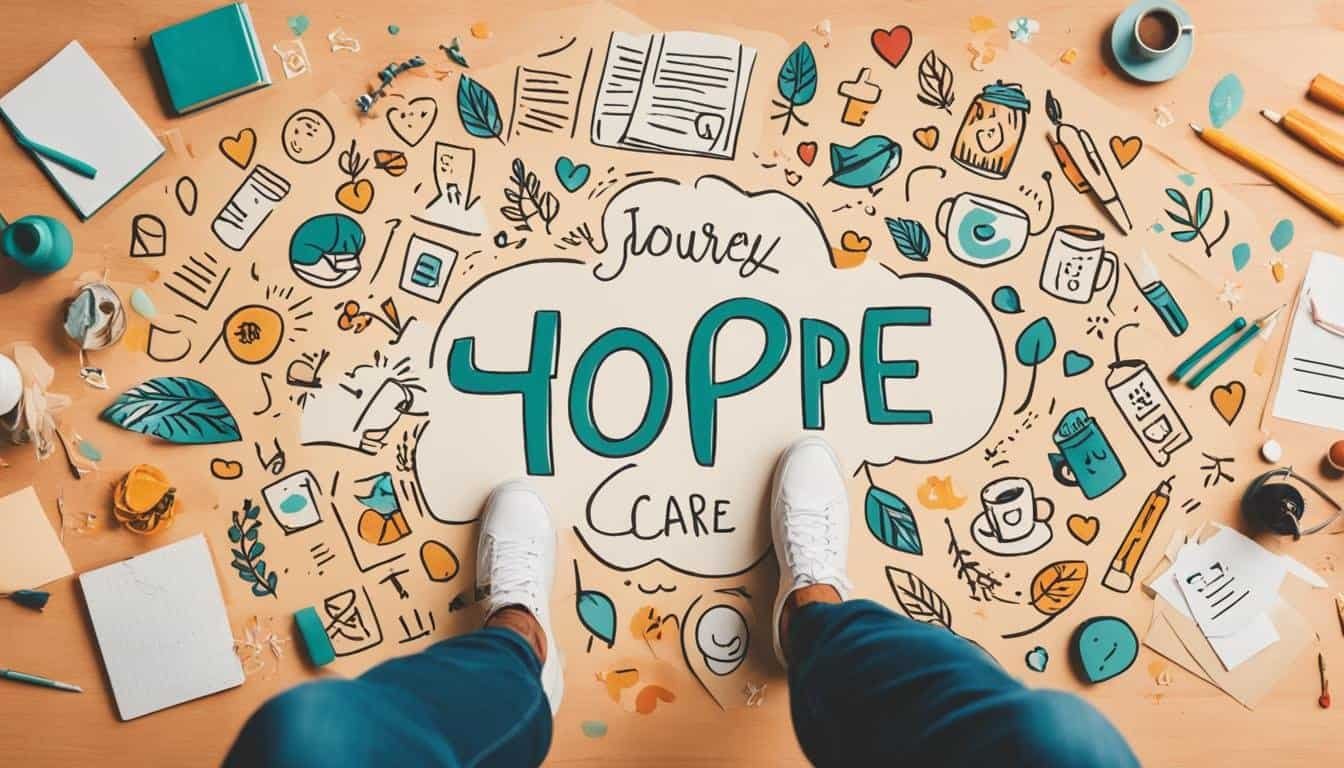Navigating Codependency in Relationships
Codependency in relationships can have a profound impact on your well-being and the dynamics with your loved ones. If you find yourself constantly prioritizing others’ needs over your own and feeling an overwhelming sense of responsibility for their happiness, you may be caught in a codependent pattern.
Recognizing the signs of codependency is the first step in navigating this complex issue. By understanding the root causes, behaviors, and impact of codependency, you can begin to take proactive steps towards healing and creating healthier relationships.
In this article, we will explore the various aspects of codependency, from its definition and signs to its impact on relationships. You will gain practical insights and actionable steps to overcome codependency and establish healthier boundaries in your relationships.
Key Takeaways:
- Codependency is a learned behavior that stems from childhood experiences.
- Recognizing the signs of codependency is crucial for navigating and overcoming this pattern.
- Codependency can have a detrimental impact on relationships, particularly when addiction or emotional abuse is involved.
- Overcoming codependency requires self-reflection, boundary setting, and a commitment to personal growth.
- Therapy and support groups can be beneficial in the recovery process.
Understanding Codependency
Codependency is a pattern of behavior that is learned from observing unhealthy relationships, particularly in childhood. It is characterized by codependent individuals who struggle with setting boundaries, fear of abandonment, and seeking validation from others. These behaviors can lead to codependent relationships where one person becomes overly reliant on the other for their sense of identity and self-worth.
In codependent relationships, individuals often prioritize the needs and desires of their partner above their own, neglecting their own well-being in the process. This can result in a cycle of enabling and dependency, where the codependent person sacrifices their own happiness and self-care for the sake of maintaining the relationship.
Codependent behaviors may include:
- Putting others’ needs before your own
- Feeling responsible for others’ happiness
- Difficulty in setting and enforcing boundaries
- Fear of being alone or abandoned
- Seeking validation and approval from others
- Low self-esteem and lack of self-worth
Understanding codependency is crucial for individuals who find themselves in these types of relationships. Recognizing the codependent behaviors and patterns can be the first step in breaking free from codependency and establishing healthier dynamics. By identifying these behaviors, individuals can begin to prioritize their own needs, set boundaries, and develop a stronger sense of self-worth outside of codependent relationships.
“Codependency is an emotional and behavioral condition that affects an individual’s ability to have a healthy, mutually satisfying relationship. It is also known as ‘relationship addiction’ because people with codependency often form or maintain relationships that are one-sided, emotionally destructive, and/or abusive.” – Mental Health America
By gaining a deeper understanding of codependency, individuals can work towards breaking free from this pattern and fostering healthier relationships. In the following sections, we will explore the signs of codependency, its impact on relationships, and strategies for overcoming and recovering from codependency.
Signs of Codependency
Codependency is a complex pattern of behavior that can manifest in various ways. Recognizing the signs of codependency is essential for understanding and addressing this issue. Here are some common signs to look out for:
- Putting others’ needs before your own: Codependent individuals often prioritize the needs of others at the expense of their own well-being.
- Feeling responsible for others’ happiness: Codependents may believe that it is their responsibility to make others happy and often feel guilty if they cannot.
- Difficulty setting boundaries: Codependent individuals struggle with establishing and maintaining healthy boundaries, often resulting in blurred or nonexistent boundaries.
- Seeking approval from others: Codependents often seek external validation and approval, basing their self-worth on the opinions of others.
- Fear of being alone: Codependent individuals may experience intense fear or anxiety when they are not in a relationship or when they are not constantly surrounded by others.
- Low self-esteem: Codependents often have a negative self-image and struggle with feelings of worthlessness and inadequacy.
Recognizing these signs in yourself or in your relationship is the first step towards creating healthier dynamics. By becoming aware of the codependent traits, you can take proactive steps to break free from this pattern and cultivate healthier, more balanced relationships.
Understanding Codependency through a Quote:
“Codependency can be identified through a variety of signs and symptoms, which often revolve around excessive reliance on others for a sense of identity and self-worth. It is crucial to recognize these signs and take the necessary steps towards healing and personal growth.”
Codependency Checklist:
| Signs of Codependency |
|---|
| Putting others’ needs before your own |
| Feeling responsible for others’ happiness |
| Difficulty setting boundaries |
| Seeking approval from others |
| Fear of being alone |
| Low self-esteem |
Use this checklist to assess whether you exhibit signs of codependency. Remember, acknowledging these signs is the first step towards personal growth and establishing healthier relationships.
The Impact of Codependency on Relationships
Codependency can have a detrimental impact on relationships, particularly when addiction is involved. Codependent individuals often enable their partner’s addictive behaviors and may neglect their own well-being in the process. This can lead to one-sided or abusive relationships where the codependent person sacrifices their own needs for the sake of their partner’s addiction or emotional well-being.
The Cycle of Enabling Behavior
Codependency and addiction often go hand in hand, creating a toxic cycle of enabling behavior. Codependents enable their partner’s addiction by making excuses for their behavior, covering up the consequences, or taking on responsibilities that should be the addict’s. This prevents the addict from facing the true impact of their actions and can perpetuate destructive patterns.
“Enabling behavior is like throwing water on a fire instead of using a fire extinguisher. It may temporarily relieve the immediate problem, but it fails to address the root cause and allows the fire to keep burning.”
By enabling their partner’s addiction, codependents inadvertently reinforce the addictive behavior and prevent their loved one from seeking help or taking responsibility. This not only harms the codependent’s well-being but also perpetuates the addiction and prevents the addict from experiencing the consequences of their actions.
The Toll of Emotional Abuse
In codependent relationships, emotional abuse is often present. Codependents may endure emotional manipulation, verbal attacks, and gaslighting from their addicted partner. This further erodes their self-esteem and sense of self-worth, making it even harder for them to break free from the codependent cycle.
The codependent individual may feel trapped, constantly walking on eggshells to avoid triggering their partner’s anger or causing them to relapse. This can lead to a constant state of anxiety, fear, and emotional turmoil.
The Impact of Codependency on Relationships
| Effects on the Codependent Individual | Effects on the Addicted Partner |
|---|---|
| Neglected well-being and self-care | Continued addiction and lack of personal responsibility |
| Low self-esteem and loss of personal identity | Dependence on the codependent for emotional support |
| Emotional abuse and manipulation | Escaping consequences and avoiding accountability |
| Isolation from friends and family | Strained or broken relationships with loved ones |
It is essential for codependents to recognize the negative impact of codependency on their relationships and their own well-being. Breaking free from enabling behavior and seeking support to address addiction and emotional abuse is crucial for creating healthier and more balanced dynamics.
Overcoming Codependency
Healing from codependency and breaking free from its grip requires a dedicated effort towards personal growth and self-reflection. By addressing underlying issues and traumas that may have contributed to codependency, you can embark on a journey of recovery and establish healthier relationships.
One of the fundamental steps in overcoming codependency is learning to prioritize your own needs. This involves setting clear boundaries and communicating them effectively with others. By understanding and asserting your own limits, you can create space for your own well-being and foster healthier dynamics in your relationships.
Developing healthy communication skills is another crucial aspect of codependency recovery. Learning to express your thoughts, feelings, and concerns openly and assertively can help break the cycle of codependent behavior. Effective communication promotes mutual understanding, builds trust, and encourages balanced interactions.
Establishing a sense of self-worth outside of codependent relationships is paramount in the journey of healing. Recognizing your own value, independent of the approval or validation of others, is essential for breaking free from codependency. By nurturing self-love and embracing your individuality, you can build a strong foundation for healthier and more fulfilling relationships.
Remember, overcoming codependency is not an overnight process. It requires dedication, self-compassion, and a willingness to seek professional help if needed. Therapy can provide invaluable guidance and support on your path to recovery.
“Recovery involves learning to prioritize your own needs, developing healthy communication skills, and establishing a sense of self-worth outside of codependent relationships.”
Below is a table outlining key steps in the journey of overcoming codependency:
| Codependency Recovery Steps |
|---|
| 1. Self-reflection and addressing underlying issues |
| 2. Setting and communicating boundaries |
| 3. Developing healthy communication skills |
| 4. Establishing a sense of self-worth |
| 5. Seeking professional help and therapy |
By embracing these steps and committing to your personal growth, you can break free from codependency and cultivate healthier, more fulfilling relationships.
Additional Resources:
- Codependents Anonymous – Find support and connect with others on the path to recovery.
- Therapy for Codependency – Discover different therapy techniques and approaches for overcoming codependency.
- Self-Help Books on Codependency – Explore recommended literature on codependency recovery and personal growth.
Codependency Therapy and Support
If you’re seeking to overcome codependency, therapy can be an invaluable tool to support your journey towards healing and growth. Codependency therapy techniques are designed to help you gain insight into the underlying patterns and behaviors that contribute to codependency, while providing practical strategies to develop healthier relationship dynamics.
Codependency counselors, also known as codependency therapists or addiction counselors, specialize in working with individuals struggling with codependency. These professionals have expertise in addressing the unique challenges associated with codependency and can offer personalized guidance and support.
In addition to individual therapy, joining a codependency support group can be highly beneficial. Codependency support groups, such as Codependents Anonymous (CoDA), provide a safe and non-judgmental environment where you can connect with others who share similar experiences. These groups offer peer support, a forum for sharing personal stories, and a space to learn from others who are on a similar path of recovery.
Whether you choose therapy or support groups, or a combination of both, the most important thing is to take the first step towards seeking help. Remember that you don’t have to navigate codependency alone. There are professionals and communities ready to support you on your journey towards healing and creating healthier relationships.
“Therapy and support groups can provide the guidance, validation, and strategies necessary to break free from codependent patterns and establish healthier relationships.” – Sarah Johnson, Licensed Therapist
Benefits of Codependency Therapy and Support
Codependency therapy and support groups offer a range of benefits for individuals seeking to overcome codependency:
- Insight and self-awareness: Through therapy and support groups, you can gain a deeper understanding of codependent behaviors, their roots, and how they manifest in your life.
- Validation and support: Connecting with others who have experienced similar struggles can provide validation and a sense of belonging, making you feel less alone in your journey.
- Development of healthier coping mechanisms: Codependency therapy techniques and support groups can equip you with practical tools to develop healthier coping mechanisms and establish boundaries.
- Guidance from professionals: Codependency counselors have specialized knowledge and expertise in guiding individuals through the recovery process, offering personalized strategies to support your growth.
- Accountability: Engaging in therapy or joining a support group provides an accountability structure, as you have a dedicated space to regularly reflect on your progress and receive feedback.
Codependency Therapy Techniques
Codependency therapy utilizes various techniques and approaches to support individuals in their recovery journey. Some common therapeutic techniques include:
- Cognitive-Behavioral Therapy (CBT): CBT focuses on identifying and challenging negative thought patterns and developing healthier behaviors and coping mechanisms.
- Attachment-Based Therapy: This approach explores the impact of attachment styles on codependency and aims to establish healthier relational patterns.
- Inner Child Work: Inner child work involves exploring and addressing past traumas and emotional wounds that contribute to codependency.
- Experiential Therapy: Experiential therapy utilizes activities and role-playing exercises to help individuals gain insight into their emotions, behaviors, and relationships.
- Mindfulness-Based Therapy: Mindfulness techniques, such as meditation and breathing exercises, help individuals develop self-awareness and cultivate healthier emotional regulation.
Codependency Support Groups
Joining a codependency support group can provide a valuable source of support and encouragement in your journey towards recovery. Here are a few well-known codependency support groups:
| Support Group | Description | Website |
|---|---|---|
| Codependents Anonymous (CoDA) | A 12-step program based on the principles of Alcoholics Anonymous, providing support and fellowship for codependents. | https://coda.org/ |
| Nar-Anon | A support group specifically for families and friends of individuals struggling with addiction. | https://www.nar-anon.org/ |
| Adult Children of Alcoholics (ACA) | A support group for adults who grew up in alcoholic or dysfunctional homes, focusing on healing and recovery. | https://adultchildren.org/ |
Attending these support groups can provide you with a sense of community, an opportunity to listen and learn from others, and a platform to share your own experiences. Remember, support groups are confidential spaces where you can share openly without fear of judgment.
In conclusion, codependency therapy techniques and support groups are powerful resources that can aid your recovery journey. Therapy provides professional guidance and support, while support groups offer a sense of camaraderie and shared experiences. By leveraging these resources, you can develop healthier relationship patterns, establish boundaries, and foster personal growth.
Establishing Healthy Boundaries
One of the key steps in breaking free from codependency is establishing and maintaining healthy boundaries. Healthy boundaries are crucial for safeguarding your well-being and creating more balanced relationships. By clearly communicating your needs, expressing your feelings, and being assertive, you can set the foundation for healthier dynamics.
Benefits of Healthy Boundaries
Establishing healthy boundaries in codependent relationships offers numerous benefits. It helps to protect your emotional and mental well-being, fosters respect and mutual understanding, and promotes personal growth and independence. By setting boundaries, you create an environment that allows for open and honest communication, which is essential for establishing healthy connections.
“Setting boundaries is a way of caring for myself. It doesn’t mean I don’t love you, it means I love me.” – A quote about healthy boundaries
Setting Boundaries in Relationships
To set boundaries effectively, start by identifying your own needs, values, and limits. Reflect on what is important to you and where you feel comfortable drawing the line. Then, clearly communicate your boundaries to your partner or loved ones. Use “I” statements to express your feelings and needs assertively, such as “I feel overwhelmed when…” or “I need space to…” This helps to avoid blaming or criticizing the other person.
Remember, setting boundaries requires consistency and reinforcement. Be prepared to enforce your boundaries by saying no when necessary and advocating for your own well-being. While it may initially feel uncomfortable, it is essential for creating healthier and more balanced relationships.
| How to Set Boundaries | Examples |
|---|---|
| Clearly communicate your needs | “I need some alone time to recharge.” |
| Express your feelings assertively | “I feel overwhelmed when you constantly rely on me for emotional support.” |
| Be prepared to say no | “I’m unable to lend you money at this time.” |
| Advocate for your well-being | “I cannot attend the event as it conflicts with my self-care routine.” |
Remember that setting boundaries requires practice and self-awareness. It may take time to adjust to this new way of relating to others, but it is a vital step in creating healthier and more fulfilling relationships.
Self-Help Strategies for Codependency
Overcoming codependency requires a proactive approach and self-help strategies that focus on personal growth and well-being. By implementing these strategies, you can break free from codependent patterns and cultivate a healthier sense of self.
1. Self-Reflection Exercises
Self-reflection is a powerful tool for understanding and addressing codependency. Take time to examine your thoughts, emotions, and behaviors. Ask yourself questions such as:
“What are my deepest fears and insecurities?”
“How do my actions enable or perpetuate codependent dynamics?”
“What are the patterns I notice in my relationships?”
By gaining insight into your own motivations and patterns, you can begin to challenge and change unhealthy behaviors.
2. Journaling
Writing in a journal provides a safe space to express your thoughts, feelings, and experiences. Use your journal to explore your emotions, document progress, and identify patterns in your relationships. The act of putting your thoughts on paper can be cathartic and enlightening, helping you gain clarity and perspective on your codependency journey.
3. Practicing Self-Care
In codependent relationships, self-care often takes a backseat to the needs of others. Prioritize your own well-being by engaging in activities that bring you joy, relaxation, and fulfillment. This could include exercise, hobbies, spending time with loved ones, or self-reflection practices like meditation or mindfulness. Remember, self-care is not selfish—it is essential for your overall mental and emotional health.
4. Setting Goals
Setting goals can provide direction and motivation as you work towards overcoming codependency. Start by identifying areas of personal growth or areas in your relationships that you would like to improve. Break these goals down into smaller, manageable steps and celebrate your progress along the way. This process can help you regain a sense of control and empower you to make positive changes.
5. Developing a Support System
Building a support system of trusted friends, family, or professionals can be invaluable in your codependency journey. Surround yourself with individuals who understand and support your efforts to break free from codependent patterns. This network can provide guidance, encouragement, and accountability as you navigate the challenges of codependency recovery.
Remember, overcoming codependency takes time and effort. By incorporating these self-help strategies into your life, you can foster personal growth, develop healthier relationships, and cultivate a strong sense of self-worth.
Maintaining Healthy Relationships
Once you have overcome codependency, it is important to establish and maintain healthy relationships. Building healthy relationships starts with fostering mutual respect, open communication, and interdependence rather than codependency. By prioritizing these elements, you can create strong and fulfilling connections with your loved ones.
Fostering Mutual Respect
Mutual respect forms the foundation of a healthy relationship. It involves valuing each other’s opinions, ideas, and boundaries. When both partners treat each other with respect, it creates a safe and supportive environment where both individuals can thrive.
Open Communication
Open and honest communication is vital for maintaining healthy relationships. It allows you and your partner to express your feelings, needs, and desires effectively. By sharing your thoughts and actively listening to your partner, you can address any concerns or conflicts that may arise, fostering a deeper connection.
Interdependence Instead of Codependency
Interdependence is the key to healthy relationships. It involves recognizing and appreciating each other’s individuality, while also understanding the importance of working together as a team. Unlike codependency, where one person relies heavily on the other for their sense of self-worth, interdependence allows both individuals to maintain their independence while supporting each other’s personal growth.
| Codependency | Interdependence |
|---|---|
| One person relies on the other for their emotional well-being. | Both individuals support each other’s emotional well-being. |
| Boundaries may be unclear or nonexistent. | Clear boundaries are established and respected by both partners. |
| One person sacrifices their own needs to meet the other’s demands. | Both individuals prioritize their own needs while also considering the needs of their partner. |
| Low individual self-worth and a lack of personal identity. | Both individuals have a strong sense of self-worth and maintain their own identities. |
By embracing interdependence, you can create a relationship that is built on equality, support, and shared values.
Remember, maintaining healthy relationships requires ongoing effort and commitment. It is crucial to prioritize self-care, including setting and maintaining boundaries, while also supporting the well-being of your partner or loved ones.
Building healthy relationships is a journey that rewards you with fulfilling connections, personal growth, and a sense of mutual happiness. By cultivating mutual respect, open communication, and interdependence, you can create a nurturing environment for both yourself and your loved ones.
Conclusion
Navigating codependency in relationships can be a challenging journey, but with self-reflection, therapy, and a commitment to personal growth, you can break free from codependent patterns and build healthier connections. By prioritizing your own well-being, establishing and maintaining healthy boundaries, and fostering mutual respect, you can create fulfilling and balanced relationships. Remember that codependency recovery is a process that requires time, patience, and self-empowerment.
To overcome codependency, it is important to seek professional help if needed and address any underlying issues or traumas that may have contributed to this pattern. Therapy can provide valuable guidance and support in your journey towards healing. Additionally, joining a support group, such as Codependents Anonymous, can connect you with others who are going through similar experiences and offer a safe space for sharing and growth.
As you continue your codependency recovery, focus on building self-worth and cultivating a strong sense of identity outside of codependent relationships. Practice self-care, set goals for yourself, and surround yourself with a supportive network of friends and loved ones. Remember that maintaining healthy relationships involves prioritizing your own well-being while also supporting the well-being of your partner or loved ones. With dedication and self-empowerment, you can navigate codependency and create fulfilling, balanced relationships.






